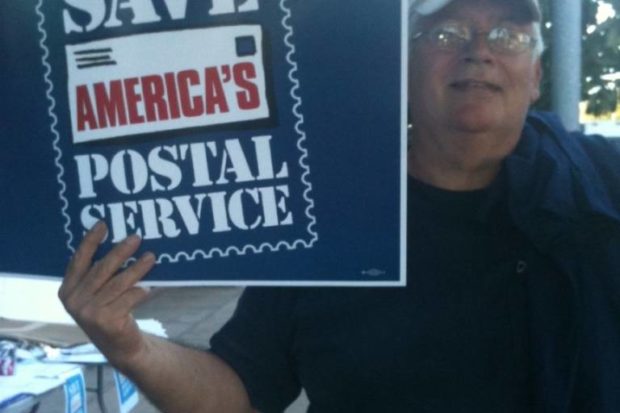
Postal Service Budget Crisis Caused by 2006 Bush Law: “Pre-Pay the Post Office Pensions 50 Years Ahead”
By Donna Macris
 The U.S. Postal Service is under attack and fighting for its life, but it isn’t for the reasons that are being spun by some: the Post Office is inefficient, the Post Office cannot compete with the Internet and the Postal Service is going bankrupt. These are smokescreens.
The U.S. Postal Service is under attack and fighting for its life, but it isn’t for the reasons that are being spun by some: the Post Office is inefficient, the Post Office cannot compete with the Internet and the Postal Service is going bankrupt. These are smokescreens.
The real reason the Postal Service is in financial trouble is that it is the only U.S. business, public or governmental, required by law to prepay its projected pension bill for the next 50 years and to pay it now.
The Postal Service would not currently be facing any deficit if it had not been forced to make advance pension payments of $25 billion over the last five years into a retirement fund for its employees including those that do not even exist yet.
The Postal Service was placed in this predicament through mandates in a “modernizing” law pushed through during the last days of the lame duck Republican Congress in December 2006: HR 6407, the Postal Accountability and Enhancement Act, which was signed into law by then President George W. Bush (Public Law 109-435).
Public Law 109-435 mandates that the Postal Service completely pay this newly created 50-year pay-it-forward pension debt through 10 massive annual payments, one every September 30 over 10 years (2006–2015).
One of those payments of $5.5 billion was missed on Sept. 30, 2011, therefore placing the Postal Service in financial jeopardy. It will be in further default if it does not meet another general governmental budget deadline of Nov. 18, 2011, established under a general government continuing resolution budget extension.
This year, however, two independent auditors have both concluded that the Post Office has actually overpaid its pension accounts into the Federal Employees Retirement System (FERS) by an estimated $50 billion–$80 billion due to decades of financial miscalculation.
The Post Office and its unions would simply like to recalculate the overpayments, have the money returned to the Postal Service and use this money to pay its bills and move forward.
Historically, the U.S. Postal Service (also known as the USPS, the Post Office or the U.S. Mail) is one of the few government agencies that was explicitly authorized in the U.S. Constitution on Sept. 22, 1789. Under Article 1, Section 8, Clause 7, of the Constitution, the Postal Clause empowers Congress “to establish post offices and post roads.”
For almost 200 years, the Post Office was a secure department within the U.S. government, held a cabinet seat and was taxpayer supported like all other government agencies.
But in 1971, President Richard Nixon removed nearly 200 years of federal protections from the Post Office when he reorganized it as the less powerful U.S. Postal Service in retaliation for the postal workers striking for a living wage in 1970. In the 1980s, the Postal Service had its funding removed.
Today, the Postal Service is the second largest employer in the United States, second only to Walmart. But unlike Walmart, the Postal Service has about 575,000 employees (of whom 25% are veterans) represented by the nation’s largest single-employer unions. It has not used any tax dollars for more than 30 years.
There are currently competing “fix-it” bills in the House of Representatives and the Senate. The issue is also before the Super Committee.
The Democrats first fix-it bill is Rep. Stephen Lynch’s (D–Mass.) HR 1351, U.S. Postal Service Pension Recalculation and Restoration Act of 2011. Supported by 226 Congressional cosponsors, HR 1351 would allow the Postal Service to recalculate its overpayments of $50 billion–$80 billion and return these funds so the Post Office can pay its current bills including the overdue prefunding pension payment.
Rep. Elijah Cummings’ (D–Md.) HR 2884 would give the Postal Service a 90-day extension until Dec. 30, 2011, to make its prefunding payment. And HR 2967, Innovate to Deliver, would lift restrictions, thereby allowing the Postal Service to introduce new product lines and enter new markets.
Sen. Max Baucus (D–Mont.), who is chairman of the Senate Finance Committee and sits on the Super Committee, has introduced the companion bill S. 1649, the Recalculation and Restoration Act of 2011. Sen. Barbara Mikulski (D–Md.) added S. 1688. Together, these bills allow the Post Office to restore its overpaid funds, save rural post offices, save postal jobs and pay its bills.
The Republican bills do just the opposite.
Rep. Darrel Issa (R–Calif.) introduced HR 2309, the Postal Reform Act of 2011, with just one cosponsor in the House. However, as the Republican chairman of the powerful House Committee on Oversight and Government Reform, Issa was able to pass his own bill through his own committee, advancing it to the floor of the House while effectively blocking all the Democrat-sponsored bills.

Issa’s HR 2309 has been described as a destructive and job-killing bill. It would heavily restrict and regulate the Postal Service, mandate cutting 110,000 postal jobs, close thousands of rural post offices and eliminate Saturday mail deliveries. Sen. John McCain (R–Ariz.) has introduced the Republicans’ equally restrictive companion bill in the Senate, S. 1625, the Postal Reform Act of 2011.
The Postal Service has been battling back starting with its national Save Our Postal Service Rally on Sept. 27, 2011. An estimated 50,000 Americans including postal workers, the AFL-CIO and farmworker unions, progressive Democrats and the public participated in rallies outside 550 Congressional offices, including the Congressional offices here in the Valley of Representatives Jeff Denham, Devin Nunes and Jim Costa.
There are informational ads on TV and petition drives that the public can access on union web sites such as the National Association of Letter Carriers (www.nalc.org).
The constitutional right of Americans to have a Postal Service is under attack. There has been a 40-year Republican effort to discredit, dismantle and privatize the Post Office. It may be on the chopping block in the Super Committee right now.
The only thing that can stand in the way is the American people—if we use our collective voice.
*****
Donna Macris is the healthcare leader of the Central Valley–Sierra Progressives and is a published lifelong human rights advocate. Contact her at dmacris@aol.com.
